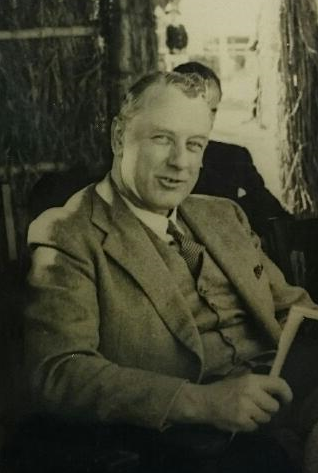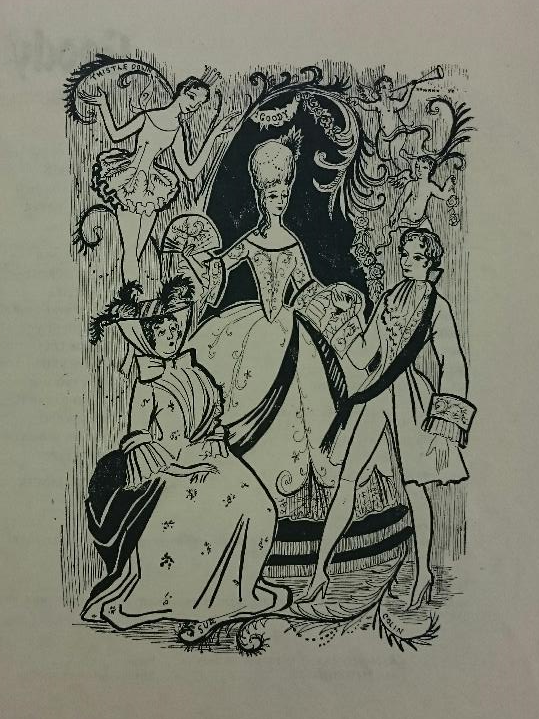Robert Montgomery was an Argyll-born weaver’s son who became a headmaster in Huddersfield. While the archive is light on his papers, it may contain a long-lost gem of Highland romanticism, Robert’s draft novel The Last of the Clans. Or perhaps not – as his son, Neil, wryly writes in a preface:
“For the main part, however, the novel is hardly a success. My father never intended to publish it, or if he ever entertained such an idea he quickly abandoned it.”
Neil Montgomery was a distinguished psychiatrist who became the superintendent of Storthes Hall Hospital, a Huddersfield asylum. He had a strong interest in metaphysics, literature and theological matters with a particular interest in the philosophical poetry of Denis Saurat (1890-1958), an Anglo-French scholar, writer and broadcaster.
The Montgomery children went on to excel in divergent fields. Hugh Montgomery studied at Merton College, Oxford and became a physicist, working among other places at the Harwell Research Laboratory in Oxford. He was a member of the Scottish Arctic Club and one of the features of the family archive are his photographs of expeditions to Greenland and Iceland in the 1970s and 1980s. Lesley Montgomery (who in 1986 married Alan Le Claire, also a physicist and originally Hugh Montgomery’s boss) became a much respected librarian, finishing her career as Librarian of Worcester College, Oxford (1977-1992). She was an expert, in particular, on seventeenth-century Britain, a hub of scholarly work on the period, and friend to researchers, reflected in the large pile of letters from Eric Sams, a musicologist and a Shakespeare scholar. The archive also features Lesley’s literary works as a playwright and author, including the script she wrote for Worcester College students to dramatize the Putney Debates of 1647, which was eventually produced for BBC radio. She went on to write other BBC Third Programme documentaries and to write and lecture on subjects including Kenelm Digby (manuscripts collected by Digby can be found in the Bodleian [PDF]).
The Montomery family archive is notable for the warmly affectionate, psychologically informed, intellectually stimulating, and open-minded correspondence between family members. In a letter from Neil Montgomery to Lesley, then 24, on the 16th of June, 1951, he writes about divorce, repression, the emancipation of women and the sexual sphere.
“The insistence on feminine chastity is of course a culture pattern belonging to a firmly based patriarchal society […] the demand for chastity of wives and daughters is basically the jealousy of the “Old Man”, the father, against all younger males. […] Nevertheless in a properly regulated society the vote will be a useful thing to have. So too will sexual freedom. Women will then be able to choose chastity freely and not forced to accept it as something imposed upon them by the lordly male. And that, unless I am much mistaken, will be in basic accord with the normal woman’s nature. […] Deep in her bones woman knows what the biological meaning of all this sex business is. She must have a stable home for the children which are born. Therefore she is instinctively against promiscuity. […] So then I come back to my genial Victorian corner. The sanctity of marriage is not overthrown. Women can still be paragons of virtue, and at the same time I can lay claim to be in the vanguard of modern thought. Did ever you know a better of [sic] example of having one’s cake and one’s halfpenny?”
The archive is particularly strong on early twentieth-century psychological theories, and their intersections with literature, philosophy and theology. It is also notable for Neil Montgomery’s correspondence with Philippe Mairet and W.T. (Travers) Symons, editors of the New English Weekly; the long sequence of letters from Eric Sams to Lesley Le Claire; a series of draft articles written by the mathematician Ethel Maud Rowell; and the transatlantic, wartime letters written by Margaret Montgomery (the honorary secretary of the Huddersfield Association of University Women) to Lydia Lagloire of Quebec City, Canada (a fellow University Woman) which touch on conditions in the U.K. and Canada and the political situation in Quebec, among many other matters.





